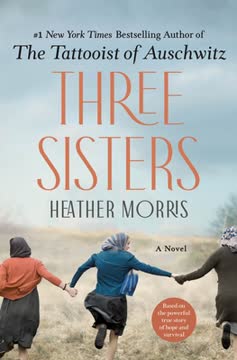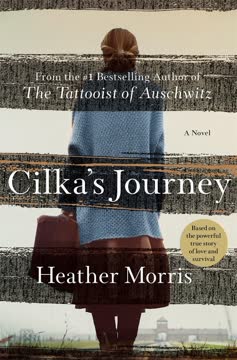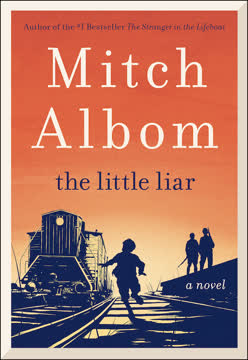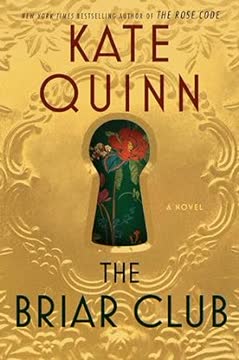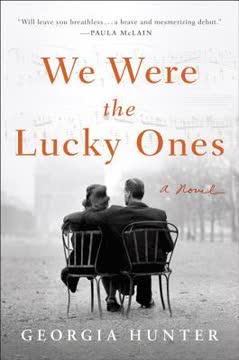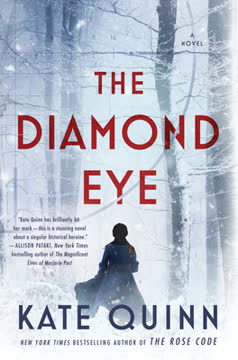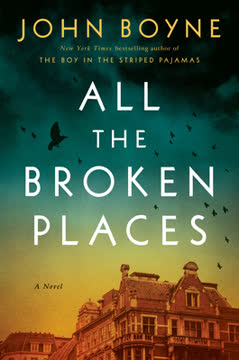Plot Summary
A Father's Lasting Promise
In 1929 Slovakia, Menachem Meller gathers his daughters, Cibi, Magda, and Livi, to make a solemn promise: they must always protect and stay with each other. This promise becomes a guiding light as the sisters face the looming shadows of war and separation. Menachem, burdened by a war injury, fears he may not be there to guide them into adulthood. His plea for unity is a poignant moment that foreshadows the trials the sisters will endure, setting the emotional foundation for their journey.
Sisters Torn by War
By 1942, the Meller family is fractured by the war. Cibi, driven by Zionist ideals, joins a training camp, while Magda is hospitalized to avoid Nazi conscription. Livi, the youngest, is ordered to report for forced labor. Cibi, honoring her promise, decides to accompany Livi, leaving their mother, Chaya, and grandfather, Yitzchak, behind. The sisters' departure is a heart-wrenching moment, underscoring the brutal impact of war on family ties and the strength of their bond.
The Harsh Reality of Captivity
Cibi and Livi arrive at Auschwitz, where they endure dehumanizing conditions and forced labor. Stripped of their identities, they are reduced to numbers and struggle to maintain their humanity amidst the brutality. The sisters' resilience is tested as they navigate the camp's horrors, clinging to their father's promise and each other for strength. Their journey highlights the relentless cruelty of the Holocaust and the indomitable spirit required to survive.
A Glimmer of Hope
Amidst the despair, small acts of kindness and moments of levity offer the sisters hope. Cibi's ability to read and write earns her a clerical position, providing a slight reprieve from the harsh labor. Livi's discovery of a knife becomes a symbol of their determination to survive. These moments of resilience and solidarity among the prisoners underscore the human capacity for hope and resistance, even in the darkest times.
The Unyielding Bond of Family
In 1944, Magda is captured and brought to Auschwitz, where she is miraculously reunited with Cibi and Livi. Their reunion is a powerful testament to the enduring strength of their bond and their father's promise. Despite the camp's horrors, the sisters find solace in each other, reigniting their hope for survival. This chapter highlights the unbreakable ties of family and the power of love to transcend even the most harrowing circumstances.
A New Beginning in Israel
The sisters, Cibi, Magda, and Livi, finally reach Israel, a land of hope and new beginnings. They are greeted by the vibrant life of Haifa, a stark contrast to the horrors they left behind. The sisters are filled with a mix of relief and anticipation as they step onto Israeli soil, ready to start anew. They are taken to a kibbutz, where they begin to integrate into the community, learning Hebrew and contributing to the collective life. This chapter captures the sisters' first steps in a land that promises freedom and a future, highlighting their resilience and determination to rebuild their lives.
The Weight of Memories
As the sisters settle into their new lives, they are haunted by memories of Auschwitz and the loved ones they lost. Each sister grapples with survivor's guilt, questioning why they survived when so many others did not. Magda, in particular, struggles with the guilt of not having been in the camp as long as her sisters. The chapter delves into the psychological scars left by their experiences, exploring how they cope with these memories while trying to embrace their new reality. The sisters find solace in each other, their bond a source of strength and healing.
A Promise Fulfilled
The sisters' promise to their father to stay together is fulfilled as they reunite with their uncle Ivan and his family in Israel. This reunion is bittersweet, as they remember those who did not survive. The chapter highlights the importance of family and the enduring power of promises made in the darkest times. The sisters' reunion with their uncle symbolizes the resilience of familial bonds and the hope of rebuilding a family in a new land. It underscores the theme of love and loyalty that runs throughout their journey.
Building a New Life
The sisters work tirelessly to build a new life in Israel, contributing to the development of their community. They engage in various jobs, from working in the orange groves to helping construct new homes. Their efforts are driven by a desire to honor those they lost and to create a better future for themselves and their descendants. This chapter illustrates the sisters' determination and adaptability, as they navigate the challenges of a new country while holding onto their cultural identity. It emphasizes the theme of resilience and the power of community in overcoming adversity.
Love and Legacy
As the sisters settle into their new lives, they find love and start families of their own. Cibi, Magda, and Livi each marry and have children, continuing the legacy of their family. Their marriages bring joy and a sense of normalcy, but also highlight the lingering effects of their past traumas. The chapter explores how love and family provide healing and hope, allowing the sisters to look forward to the future. It underscores the theme of legacy, as the sisters pass on their stories and values to the next generation.
A Family Reunited
The sisters gather with their extended family to celebrate their journey and the lives they have built in Israel. This reunion is a testament to their survival and the fulfillment of their father's promise. As they reflect on their past, they honor the memories of those they lost and celebrate the new lives they have created. The chapter captures the joy and gratitude of being together, highlighting the enduring strength of family bonds. It serves as a poignant reminder of the resilience of the human spirit and the power of love to overcome even the darkest of times.
Characters
Cibi Meller
Cibi, the eldest sister, is a pillar of strength and resilience. Her unwavering commitment to her father's promise drives her to protect her sisters at all costs. Throughout their journey, Cibi's leadership and determination are crucial to their survival. She embodies the spirit of hope and perseverance, finding ways to rebuild her life in Israel while honoring the memory of those they lost. Cibi's character highlights the power of love and loyalty in overcoming adversity.
Livi Meller
Livi, the youngest sister, is initially portrayed as innocent and naive, but her experiences in Auschwitz reveal her inner strength and resilience. Despite the horrors she endured, Livi maintains her hope and spirit, often finding solace in her bond with Cibi and Magda. Her journey from innocence to resilience underscores the transformative impact of the Holocaust on young lives. Livi's character represents the enduring power of hope and the importance of family in healing and rebuilding.
Magda Meller
Magda's journey is marked by her gentle nature and fierce determination to reunite with her sisters. Her capture and eventual reunion with Cibi and Livi highlight her resilience and the strength of their familial bond. Magda's character development reflects the enduring power of love and family amidst the horrors of war. Her nurturing spirit and ability to find joy in small moments provide comfort and hope to her sisters.
Menachem Meller
Menachem's early plea for his daughters to stay together sets the emotional foundation for the sisters' journey. His character represents the enduring influence of parental love and guidance, even in his absence. Menachem's promise becomes a guiding light for the sisters, underscoring the importance of family bonds in times of crisis.
Chaya Meller
Chaya's character embodies the sacrifices and strength of a mother during wartime. Her struggle to protect her daughters and maintain hope amidst the chaos of war highlights the emotional toll on families. Chaya's eventual capture and tragic fate underscore the devastating impact of the Holocaust on families.
Yitzchak Meller
Yitzchak provides wisdom and support to the Meller family, offering guidance and comfort in their darkest moments. His character represents the enduring strength of familial bonds and the importance of passing down values and traditions. Yitzchak's presence is a source of stability and hope for the sisters.
Ziggy Ravek
Ziggy, Livi's husband, is a source of love and support for her. Despite his own traumatic past, Ziggy is determined to build a future with Livi, providing her with the stability and love she needs to heal. His character highlights the importance of partnership and understanding in overcoming the scars of the past. Ziggy's love for Livi is a testament to the healing power of relationships and the possibility of finding happiness after trauma.
Yitzchak Guttman
Yitzchak, Magda's husband, is a kind and supportive partner. His love for Magda and their family is unwavering, providing her with the strength and stability she needs to move forward. Yitzchak's character represents the possibility of finding love and happiness after the horrors of war. His relationship with Magda underscores the theme of healing through love and the importance of building a future together.
Plot Devices
The Promise
The promise made by the sisters to their father serves as a central plot device, driving their actions and decisions throughout the narrative. This promise symbolizes the enduring power of family bonds and the strength derived from unity. It serves as a guiding light for the sisters, providing hope and resilience in the face of unimaginable adversity. The promise is a testament to the power of love and loyalty in overcoming the darkest of times.
The Tattoo
The tattooing of numbers on the prisoners' arms is a powerful plot device that underscores the dehumanization experienced by the sisters in Auschwitz. This act strips them of their identities, reducing them to mere numbers. However, the tattoo also becomes a symbol of survival, as it marks their existence and connection to each other in the camp.
The Knife
Livi's discovery of a small knife becomes a significant plot device, symbolizing the sisters' determination to survive. The knife represents a small measure of control and agency in a world where they have little power. It serves as a talisman of hope and resilience, highlighting the sisters' resourcefulness and will to endure.
The Reunion
The reunion of the sisters in Auschwitz and later in Israel serves as a pivotal plot device, providing an emotional climax to their journey. This moment underscores the enduring strength of their bond and the power of love to transcend even the most harrowing circumstances. The reunion offers a glimmer of hope and resolution amidst the despair of the Holocaust, highlighting the resilience of the human spirit and the importance of family in healing and rebuilding.
Analysis
"Three Sisters" by Heather Morris is a poignant exploration of the enduring power of family bonds amidst the horrors of the Holocaust. The narrative is anchored by the promise made by Menachem Meller to his daughters, which serves as a guiding light throughout their harrowing journey. The sisters' resilience and determination to survive are underscored by their unwavering commitment to each other, highlighting the strength derived from unity and love. The book delves into the psychological scars left by their experiences, exploring themes of survivor's guilt, resilience, and the healing power of family. As the sisters rebuild their lives in Israel, they find hope and healing through love and community, underscoring the resilience of the human spirit and the possibility of finding happiness after trauma. The story serves as a testament to the power of promises made in the darkest times and the enduring legacy of love and family.
Last updated:
FAQ
Synopsis & Basic Details
What is Three Sisters about?
- Unbreakable Sisterly Promise: Three Sisters by Heather Morris chronicles the harrowing journey of Cibi, Magda, and Livi Meller, who, as young girls in 1929 Slovakia, make a solemn promise to their dying father to always stay together, no matter what. This pact becomes their guiding principle as the Holocaust engulfs Europe.
- Survival Against Odds: The narrative follows the sisters through their forced deportation to Auschwitz-Birkenau, where they endure unimaginable brutality, starvation, and dehumanization. Their bond is tested by separation, illness, and the constant threat of death, yet they cling to each other and their promise as their only hope for survival.
- Rebuilding in a New Land: After surviving the concentration camps and a brutal death march, the sisters return to a changed Slovakia before embarking on a perilous journey to the newly formed state of Israel. There, they strive to build new lives, find love, and raise families, all while grappling with the profound scars of their past and honoring the memory of those they lost.
Why should I read Three Sisters?
- Inspiring Human Resilience: This novel offers a deeply moving testament to the human spirit's capacity for resilience, hope, and love in the face of unimaginable evil. The sisters' unwavering commitment to each other, even in the most horrific circumstances, provides a powerful and inspiring narrative of survival.
- Unique Perspective on the Holocaust: Beyond the well-documented atrocities, the book delves into the subtle acts of resistance, unexpected kindness from unlikely sources, and the complex psychological toll of survival, offering a nuanced and intimate portrayal of life within and after the camps. It highlights the personal cost of war and the enduring strength of familial bonds.
- Emotional Depth & Historical Insight: Heather Morris masterfully blends historical accuracy with profound emotional depth, drawing from real-life testimonies. Readers gain insight into the daily realities of concentration camp life, the challenges of post-war displacement, and the enduring impact of trauma, all while being swept up in a story of profound sisterly love.
What is the background of Three Sisters?
- Slovakian Jewish Experience: The story is rooted in the historical context of Jewish life in Vranov nad Topl'ou, Slovakia, before and during World War II. It details the gradual erosion of rights, the rise of the Hlinka Guard, and the systematic deportation of Slovakian Jews, providing a specific regional lens on the broader Holocaust narrative.
- Hachshara & Zionist Ideals: The book highlights the Hachshara movement, a pre-war Zionist training program that prepared young Jews for agricultural life in Palestine. Cibi's early involvement in this movement (Chapter 2) foreshadows the sisters' eventual journey to Israel, connecting their personal survival to the larger historical aspiration of a Jewish homeland.
- Post-War Displacement & Aliyah: The narrative extends beyond liberation, illustrating the complex realities of post-war Europe, including the rise of communist rule in Slovakia and the challenges faced by Jewish survivors seeking new homes. Their journey to Israel (Aliyah) reflects the mass migration of Holocaust survivors to the nascent state, driven by both hope and necessity.
What are the most memorable quotes in Three Sisters?
- "The three of you are stronger together, you must never forget that." (Menachem Meller, Prologue): This foundational quote, spoken by their father, encapsulates the central theme of the sisters' unbreakable bond and serves as a constant reminder and source of strength throughout their ordeal, driving their every decision to stay united.
- "We will eat stones, nails, and whatever we can get our hands on, but we must survive this place." (Cibi Meller, Chapter 6): Uttered by Cibi upon their arrival at Auschwitz, this stark declaration reveals her fierce determination and pragmatic will to survive, setting the tone for the brutal realities they face and her unwavering commitment to protecting Livi.
- "There is no honour in suffering, that's what I'm trying to tell you." (Magda Meller, Chapter 28): Magda's powerful statement to Yitzchak, grappling with survivor's guilt, challenges the notion that suffering equates to worthiness. It's a profound insight into the psychological aftermath of trauma, emphasizing that survival, regardless of the means, is the ultimate victory.
What writing style, narrative choices, and literary techniques does Heather Morris use?
- Accessible, Direct Prose: Morris employs a straightforward, unadorned writing style that makes the horrific events accessible without sensationalizing them. Her prose is clear and direct, allowing the emotional weight of the sisters' experiences to resonate without complex literary flourishes.
- Intimate Third-Person Perspective: The narrative primarily uses a close third-person point of view, often shifting between the sisters, allowing readers deep insight into their individual thoughts, fears, and coping mechanisms. This choice fosters strong empathy and personal connection to their journey.
- Focus on Dialogue and Internal Monologue: A significant portion of the storytelling is conveyed through dialogue, revealing character relationships and advancing the plot, alongside internal monologues that expose the sisters' psychological states and unspoken struggles. This technique brings their emotional realities to the forefront, such as Livi's internal battle with her memories or Cibi's moments of despair.
Hidden Details & Subtle Connections
What are some minor details that add significant meaning?
- The Oleander Bush's Resilience: The drooping oleander bush in the Prologue, which their mother "tried so hard to coax back to life," subtly foreshadows the Meller family's own struggle for survival and renewal. Its later flourishing (Chapter 18) symbolizes a glimmer of hope and continuity for the family, mirroring their own enduring spirit despite immense loss.
- Livi's Childhood Lullaby as a Lifeline: Cibi singing "My Little Angel" to Livi in the synagogue (Chapter 6) and Livi later singing it to her newborn nephew Oded (Chapter 31) is a poignant callback. This seemingly minor detail transforms into a powerful motif of comfort, protection, and the transmission of love and heritage across generations, even in the face of unspeakable horror.
- The Candlesticks as Tangible Heritage: Magda's decision to hide the family's silver candlesticks and photos in the ceiling (Chapter 18) is more than just preserving possessions; it's an act of safeguarding their identity and memory. Their reappearance in Bratislava (Chapter 26) and later use in Israel (Chapter 29) symbolize the enduring flame of their family and faith, a physical link to their lost home and loved ones.
What are some subtle foreshadowing and callbacks?
- Cibi's Hachshara Training: Cibi's early training with the Hachshara (Chapter 2) is subtly foreshadowed as crucial for her survival skills. Her ability to drive a truck, her knowledge of farming, and her general self-sufficiency prove invaluable in the camps and later during their escape and new life in Israel, demonstrating how seemingly unrelated skills gain profound significance.
- The "Work Sets You Free" Sign's Ironic Truth: The sign "ARBEIT MACHT FREI" (Work Sets You Free) above the Auschwitz gates (Chapter 6) is a chilling piece of foreshadowing. While initially a lie, Cibi later reflects on its twisted meaning (Chapter 10), realizing that for some, work did offer a temporary reprieve from immediate death, highlighting the perverse logic of the camp.
- Magda's "Strength and Hope" Mantra: Magda's discovery of the sword lily and her grandfather's lesson on its meaning ("strength of character" and "hope") in Chapter 18 becomes a powerful callback during the death march (Chapter 23). Recounting this story to her sisters provides them with vital emotional sustenance, transforming a personal memory into a shared source of resilience.
What are some unexpected character connections?
- Ingrid and Rita's Unseen Network: The connection between Kapo Ingrid and Kapo Rita (Chapter 10), where Ingrid asks Rita to "look out for" Cibi and Livi, reveals an unexpected network of influence within the camp hierarchy. This subtle detail suggests that even within the brutal system, personal relationships, however tenuous, could offer a slim chance of survival.
- SS Officer Armbruster's Quiet Compassion: Armbruster, Cibi's supervisor in the Kanada office (Chapter 11), shows surprising moments of quiet compassion, providing Cibi with warm water, ointment, and tea for her frostbitten feet. This unexpected kindness from an SS officer challenges the monolithic portrayal of perpetrators, hinting at individual variations in cruelty and humanity.
- Ziggy as a "Peacock Boy": Livi's later realization that Ziggy, her future husband, was one of the "Peacock Boys" on the ship to Israel (Chapter 30) is a subtle, almost fated connection. It highlights how their paths unknowingly crossed before their formal introduction, adding a layer of destiny to their relationship and underscoring the idea of finding connection amidst a shared, traumatic past.
Who are the most significant supporting characters?
- Dr. Kisely: The Moral Compass: Dr. Kisely, the Christian doctor who admits Magda to the hospital (Chapter 1) to save her from deportation, represents a rare beacon of moral courage and resistance. His actions, though small in the grand scheme, demonstrate the power of individual defiance against systemic evil and directly contribute to Magda's initial survival.
- Rita: The Ambiguous Protector: Rita, the kapo in Birkenau, is a complex figure who embodies the moral ambiguities of survival within the camp. While capable of cruelty, her subtle acts of protection towards Cibi and Livi—like providing Livi with a coat (Chapter 9) and saving her from Block 25 (Chapter 29)—reveal a hidden layer of humanity, suggesting that even those complicit in the system could offer unexpected mercies.
- Ivan: The Enduring Family Link: Uncle Ivan, Chaya's brother, serves as the family's anchor in Vranov after the sisters' departure. His persistent efforts to gather information and protect his remaining family (Chapter 12, 21) highlight the broader community's struggle and the enduring strength of extended family ties, even as he grapples with his own powerlessness.
Psychological, Emotional, & Relational Analysis
What are some unspoken motivations of the characters?
- Cibi's Need for Control: Cibi's consistent drive to take charge, from chastising Livi as a child (Prologue) to confronting SS officers (Chapter 6, 19), stems from an unspoken need for control in a world where they have none. This motivation, while sometimes risky, is her primary coping mechanism, allowing her to feel agency and protect her sisters.
- Magda's Guilt-Driven Determination: Magda's fierce determination to join her sisters (Chapter 8) and her later efforts to preserve family memories (Chapter 18) are deeply motivated by unspoken survivor's guilt. Her feeling of having been "spared" while Cibi and Livi suffered fuels her need to prove her worth and contribute to their collective survival and healing.
- Livi's Selective Detachment as Self-Preservation: Livi's initial inability to process the shaving of her hair (Chapter 9) and her later tendency to "float away" during traumatic events (Chapter 17) reveal an unspoken psychological defense mechanism. This selective detachment allows her to endure horrors too great to confront directly, preserving her sanity and capacity for hope.
What psychological complexities do the characters exhibit?
- Cibi's Bravado and Inner Fragility: Cibi often displays outward bravado, confronting guards and taking risks, but internally, she grapples with immense fear and despair. Her collapse after her mother's death (Chapter 21) and her later struggle with faith (Chapter 29) expose the psychological toll beneath her strong exterior, highlighting the immense pressure of being the primary protector.
- Livi's Lingering Trauma and Hope: Livi's psychological complexity is evident in her recurring nightmares and the "tingle" of dread she feels at moments of change (Chapter 29), even years after liberation. This contrasts with her remarkable capacity for joy and hope, illustrating the enduring, often contradictory, nature of trauma and the human spirit's ability to seek light.
- Magda's Burden of Guilt and Empathy: Magda's survivor's guilt is a central psychological complexity, leading her to feel she "didn't suffer enough" (Chapter 28). This deep empathy also allows her to connect with others' pain, like Yitzchak's, and to understand the nuanced experiences of survival, making her a source of emotional wisdom for her sisters.
What are the major emotional turning points?
- Livi's Hair Shaving Realization: Livi's delayed emotional reaction to her shaven head (Chapter 9), when she sees her reflection, is a major turning point. It marks her forced confrontation with the dehumanizing reality of the camp, shattering her innocence and forcing her to acknowledge the profound loss of identity.
- Cibi's Breakdown After Mother's Death: Cibi's complete collapse and uncontrollable sobbing after witnessing her mother and grandfather led to the gas chamber (Chapter 21) is a pivotal emotional turning point. It represents the breaking point of her carefully constructed resilience, a raw expression of grief and powerlessness that she had suppressed for years.
- Magda's Confrontation with Visik: Magda's defiant confrontation with Visik (Chapter 18), her former school friend turned Hlinka Guard, is a significant emotional moment. It marks her transition from passive hiding to active resistance, fueled by anger and a refusal to be intimidated, showcasing her growing inner strength and defiance.
How do relationship dynamics evolve?
- Sisterly Roles Shift and Intertwine: The initial dynamic of Cibi as the sole protector and Livi as the protected "kitten" (Prologue, Chapter 6) evolves significantly. Magda's arrival (Chapter 21) and her own experiences lead to a more interdependent relationship, where all three sisters take turns supporting each other, as seen in Magda's strength on the death march (Chapter 23) and Livi's later care for Cibi (Chapter 15).
- Complex Bonds with Perpetrators: The relationships with figures like Kapo Rita and SS Officer Armbruster evolve from fear and suspicion to a nuanced understanding of their ambiguous roles. Cibi's ability to "curry favor" (Chapter 9) and Rita's occasional mercies (Chapter 10, 15) highlight the complex survival strategies and the blurred lines of morality within the camp system.
- Post-War Relationships Forged in Shared Trauma: After liberation, the sisters' relationships with other survivors, particularly their future husbands Ziggy and Yitzchak, are deeply shaped by their shared experiences. These bonds are characterized by profound understanding, empathy, and a mutual commitment to healing and building a new life, as seen in Ziggy's patience with Livi's trauma (Chapter 30) and Yitzchak's shared guilt with Magda (Chapter 28).
Interpretation & Debate
Which parts of the story remain ambiguous or open-ended?
- The Fate of Eva: The young Yugoslav girl, Eva, who the sisters care for during the death march (Chapter 23) and in Germany (Chapter 24), is ultimately separated from them at the repatriation camp (Chapter 25). Her fate, whether she found family or a new home in Yugoslavia, remains unknown, leaving a poignant open-ended question about the many
Review Summary
Three Sisters by Heather Morris is the final book in The Tattooist of Auschwitz trilogy, based on the true story of Slovakian sisters Cibi, Magda, and Livi. The novel follows their experiences before, during, and after Auschwitz, highlighting their promise to stay together and their will to survive. While some readers found the writing style simplistic, many appreciated the powerful tale of resilience, family bonds, and life after the Holocaust. The book received mixed reviews, with some praising its emotional impact and others feeling it lacked depth compared to previous installments.
The Tattooist of Auschwitz Series
Similar Books
Download PDF
Download EPUB
.epub digital book format is ideal for reading ebooks on phones, tablets, and e-readers.
